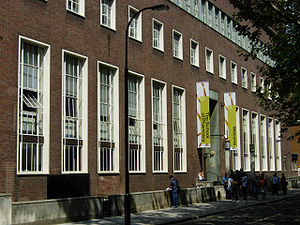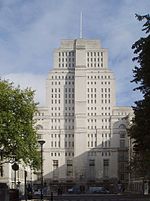- School of Pharmacy, University of London
-
The School of Pharmacy, University of London 
Motto Salutifer Orbi Motto in English Bringing Health to the World Established 1949 - Incorporated into the University of London
1842Type Public Chancellor HRH The Princess Royal Principal Professor Anthony W Smith FRPharmS Dean Professor Anthony W Smith FRPharmS Students 1355 [1] Undergraduates 730 [1] Postgraduates 625 [1] Location London, England Campus Central London Nickname The Square Mascot Oni Affiliations University of London
Universities UKWebsite www.pharmacy.ac.uk 
The School of Pharmacy is a constituent college of the University of London. It was founded by the Royal Pharmaceutical Society of Great Britain in 1842 as the College of the Pharmaceutical Society, and was granted a royal charter in 1952. In 1926 it became a school of the University of London. It was later renamed The School of Pharmacy in 1949 when it became independent of the Pharmaceutical Society and was incorporated into the University of London.
Designed by Herbert Rowse, construction of the current building began in 1938 however, construction work was stopped on the outbreak of the Second World War in 1939. The building was not completed until 1960. [2] To its alumni and colleagues in the profession it is known as "the Square", which refers to the fact that it was originally located in Bloomsbury Square and now in Brunswick Square.
The School is the only free standing institution in the United Kingdom that is dedicated to teaching and research in pharmacy and the pharmaceutical sciences. The only undergraduate degree it offers is the four year MPharm, Master of Pharmacy. It also offers a number of Masters Degree programmes, in subjects including Drug Discovery, Drug Delivery, Pharmacognosy and Pharmacy Practice. The School of Pharmacy also offers PhD research degrees. The school offered BSc degrees in Toxicology and Pharmacology until 2001.
It was decided on 13th May 2011, after a consultation and development process, that the School of Pharmacy, University of London would merge with University College London (UCL).[3] The merger process is expected to be finalised by January 2012.
Contents
Organisation
The School is organised into four academic departments, each with one or more associated specialist research centres. The work of the School is further supported by staff in the Administration and Library and Information Services Departments. The Dean and Principal of the School is Professor Anthony W Smith.
Academic Departments
Pharmaceutical and Biological Chemistry
Pharmaceutical and Biological Chemistry is the largest of the four Departments at The School of Pharmacy, and the research conducted there is very wide-ranging. Much of this research is focused in cancer, natural products and phytomedicines, molecular neurosciences and biopharmaceutical analysis.
Departmental staff help teach the undergraduate MPharm degree in the areas of drug discovery, medicinal chemistry, pharmaceutical chemistry and pharmacognosy/medicinal plants, and an MSc in Pharmacognosy is to be offered for the first time this year.
Pharmacology
The Wellcome Department of Pharmacology is one of the oldest departments of pharmacology in the UK. The Department has played a major role in the development of Pharmacology in the UK and many pharmacologists who trained here are to be found in academies and in industries all over the world.
The research focuses on the nervous system, and a wide range of approaches are used to study normal brain function and the causes of many neurological and psychiatric diseases.
Pharmaceutics
The Department of Pharmaceutics is home to a wide range of research activities, such as in Materials Science and Processing and Clinical Pharmaceutical Science.
Their research in Materials Science and Processing is centred on the fundamental properties of materials and their adaptation to optimise processing and enhance drug delivery. They have many joint ventures, such as in the Centre for Paediatric Pharmacy Research, a joint venture with Great Ormond Street Hospital and the Institute of Child Health, and in the Clinical Pharmaceutics with University College Hospitals and Camden and Islington's NHS Trust.
The Microbiology Research Group is also well-established, with work focusing mainly in overcoming antibiotic resistance and obtaining new actives from natural sources. The Group has been particularly successful in investigating new approaches to the treatment of the ‘superbug’ MRSA.
Practice and Policy
The clear goal of the Department of Practice and Policy is to make the use of medicines safer and more effective through teaching, service and research.
They are a diverse group of pharmacists and social science researchers who have developed a wide network of associations with other academic disciplines, including anthropology, economics, mathematical modelling, and psychology. Their academic collaborators include University College London, Imperial College London, London School of Economics, the Institute of Education and the London School of Hygiene and Tropical Medicine. They also have strong links with several major London hospitals including Guy's and St Thomas’s, University College Hospitals, Hammersmith, Barts and the London, and Great Ormond Street.
Practice and Policy staff are involved in curricular development and teaching across all four years of the MPharm course, and the School has one of the largest postgraduate programmes in Europe. Its student body includes hospital pharmacists studying for a range of Certificate, Diploma and MSc qualifications.
Research Themes
In 2006, the School of Pharmacy ranked fifth out of a total of 146 institutions in the UK for research income as a percentage of total income. Their research focuses on advancing and understanding medicines and health care, and in creating new medicines. It is organised into four divisions.
- Drug Discovery
- Formulation Sciences
- Neurosciences
- Medicines Use and Health
Research Centres
Cancer Research UK Biomolecular Structure Group; Cancer Research UK Gene Targeted Design Research Group; Molecular Neuroscience Research Group; Centre for Pharmacognosy and Phytotherapy; Centre for Pharmaceutical Analysis; Centre for Drug Delivery Research; Centre for Toxicology; Centre for Paediatric Pharmacy Research; Centre for Behavioural Medicine; and Centre for Cancer Medicines
See also
- Pharmacy
- Royal Pharmaceutical Society of Great Britain
- List of schools of pharmacy in the United Kingdom
External links
References
- ^ a b c "Table 0a - All students by institution, mode of study, level of study, gender and domicile 2005/06". Higher Education Statistics Agency online statistics. Archived from the original on 2007-05-15. http://web.archive.org/web/20070515172721/http://www.hesa.ac.uk/holisdocs/pubinfo/student/institution0506.htm. Retrieved 2007-05-09.
- ^ Bridget Cherry and Nikolaus Pevsner, London 4: North, London, Penguin, 1999, p. 280
- ^ http://www.ucl.ac.uk/news/news-articles/1105/11051201
Universities and colleges in London Universities Birkbeck · Central School of Speech and Drama · Courtauld Institute of Art · Goldsmiths · Heythrop College · Institute of Cancer Research · Institute of Education · King's College London · London Business School · London School of Economics · London School of Hygiene & Tropical Medicine · Queen Mary · Royal Academy of Music · Royal Holloway · Royal Veterinary College · St George's · School of Oriental and African Studies · School of Pharmacy · University College London
Central Bodies: School of Advanced Study · University of London Institute in Paris · University Marine Biological Station, MillportOtherUniversity of the Arts London · Brunel University · City University London · University of East London · University of Greenwich · Kingston University · Imperial College London · London Metropolitan University · London South Bank University · Middlesex University · Roehampton University · Royal College of Art · University of Westminster · University of West LondonUniversity colleges BPP University College of Professional Studies · St. Mary'sOther university level colleges Further Education colleges Barking & Dagenham · Barnet · Bexley · Bromley · Capel Manor · Carshalton · City & Islington · City Lit · City of Westminster · Croydon · Ealing, Hammersmith & West London · Greenwich · Hackney · Haringey, Enfield & North East London · Harrow · Havering · Hillcroft · Kensington & Chelsea · Kingston · Lambeth · Lewisham · Marine Society · Mary Ward · Morley · Newham · North West London · Orpington · Redbridge · Richmond Adult · Richmond upon Thames · South Thames · Southgate · Southwark · Stanmore · Tower Hamlets · Uxbridge · Waltham Forest · West Thames · Westminster Kingsway · Working Men'sSixth form colleges BSix · Christ the King · Crossways · Coulsdon · Havering · John Ruskin · Lansdowne College · La Swap · Leyton · Newham · St Charles · St Dominic's · St Francis Xavier · Sir George Monoux · Woodhouse · Valentines · Seven KingsPharmacy schools in the United Kingdom England LondonKing's College London Department of Pharmacy · Kingston University Department of Pharmacy · School of Pharmacy, University of LondonOtherAston University School of Life and Health Sciences · University of Bath Department of Pharmacy and Pharmacology · University of Bradford School of Life Sciences · University of Brighton School of Pharmacy and Biomolecular Sciences · University of Central Lancashire School of Pharmacy and Pharmaceutical Sciences · De Montfort University School of Pharmacy · University of East Anglia School of Chemical Sciences and Pharmacy · University of Hertfordshire School of Pharmacy · Keele University School of Pharmacy · Liverpool John Moores University School of Pharmacy & Biomolecular Sciences · Medway School of Pharmacy · University of Manchester School of Pharmacy and Pharmaceutical Sciences · University of Nottingham School of Pharmacy · University of Portsmouth School of Pharmacy and Biomedical Sciences · University of Reading School of Pharmacy · University of Sunderland Faculty of Applied Sciences · University of Wolverhampton School of Applied SciencesNorthern Ireland Queen's University Belfast School of Pharmacy · University of Ulster Department of Pharmacy and Pharmaceutical SciencesScotland Robert Gordon University School of Pharmacy · University of Strathclyde Institute of Pharmacy and Biomedical SciencesWales Welsh School of Pharmacy
 Universities in the United Kingdom
Universities in the United KingdomEngland LondonBirkbeck · CSSD · Courtauld · Goldsmiths · Heythrop · ICR · IoE · King's · LBS · LSE · LSHTM · Queen Mary · Royal Academy of Music · Royal Holloway · RVC · St George's · SOAS · School of Pharmacy · UCLOtherBrunel · City · East London · Greenwich · Kingston · Imperial · London Met · London South Bank · Middlesex · RCA · Roehampton · UAL · Westminster · West LondonMidlandsAston · Birmingham · Birmingham City · Coventry · De Montfort · Derby · Keele · Leicester · Lincoln · Loughborough · Northampton · Nottingham · Nottingham Trent · Staffordshire · Warwick · Wolverhampton · WorcesterNorthBolton · Bradford · Central Lancashire · Chester · Cumbria · Durham · Edge Hill · Huddersfield · Hull · Lancaster · Leeds · Leeds Metropolitan · Liverpool · Liverpool Hope · Liverpool John Moores · Manchester · Manchester Metropolitan · Newcastle · Northumbria · Salford · Sheffield · Sheffield Hallam · Sunderland · Teesside · York · York St. JohnSouthAnglia Ruskin · Bath · Bath Spa · Bedfordshire · Bournemouth · Brighton · Bristol · Buckingham · Buckinghamshire New · Cambridge · Canterbury Christ Church · Chichester · Cranfield · Creative Arts · East Anglia · Essex · Exeter · Gloucestershire · Hertfordshire · Kent · Oxford · Oxford Brookes · Plymouth · Portsmouth · Reading · Southampton · Southampton Solent · Surrey · Sussex · UWE · WinchesterNorthern Ireland Scotland Aberdeen · Abertay Dundee · Dundee · Edinburgh · Edinburgh Napier · Glasgow · Glasgow Caledonian · Heriot-Watt · Highlands and Islands · Queen Margaret · Robert Gordon · RCS · St Andrews · Stirling · Strathclyde · UWSWales Aberystwyth · Bangor · Cardiff · Cardiff Metropolitan · Glamorgan · Glyndŵr · Newport · Swansea · Swansea Metropolitan · Trinity Saint DavidNon−geographic University colleges Birmingham · Bishop Grosseteste Lincoln · Bournemouth · BPP · Falmouth · Harper Adams · Leeds Trinity · NCH · Newman · Norwich · Plymouth St Mark & St John · St. Mary's (Belfast) · St. Mary's (Twickenham) · Stranmillis · SuffolkUniversity centres Related Categories:- School of Pharmacy, University of London
- University of London
- Educational institutions established in 1842
- Pharmacy schools
- 1842 establishments in England
Wikimedia Foundation. 2010.

